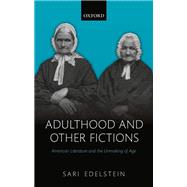Adulthood and Other Fictions American Literature and the Unmaking of Age
, by Edelstein, Sari- ISBN: 9780198831884 | 0198831889
- Cover: Hardcover
- Copyright: 2/10/2019
While the field of childhood studies has blossomed in recent years, few scholars have taken up the question of age more broadly as a lens for reading American literature. Adulthood and Other Fictions shows how a diverse array of nineteenth-century writers, thinkers, and artists responded to the rise of chronological age in social and political life. Over the course of the century, age was added to the census; schools were organized around age groups; birthday cards were mass-produced; geriatrics became a medical specialty. Adulthood and Other Fictions reads American literature as a rich, critical account of this modern culture of age, and it examines how our most well-known writers registered and often resisted age expectations, particularly as they applied to women and people of color.
More than simply adding age to the list of identity categories that have become de rigueur sites of scholarly attention, Adulthood and Other Fictions argues that these other measures of social location (race, gender, sexuality, class) are largely legible through the seemingly more natural and essential identity defined by age. That is, longstanding cultural ideals about maturity and development anchor ideologies of heterosexuality, race, nationalism, and capitalism, and in this sense, age rhetoric serves as one of our most pervasive disciplinary discourses. Writers including Louisa May Alcott, Frederick Douglass, and Henry James anticipated the ageism of our moment, but they also recognized how age norms both structure and limit the lives of individuals at all points on the age continuum. Ultimately, the volume argues for an intersectional understanding of age that challenges the celebration of independence and autonomy imbricated in US fantasies of adulthood and in American identity itself.
More than simply adding age to the list of identity categories that have become de rigueur sites of scholarly attention, Adulthood and Other Fictions argues that these other measures of social location (race, gender, sexuality, class) are largely legible through the seemingly more natural and essential identity defined by age. That is, longstanding cultural ideals about maturity and development anchor ideologies of heterosexuality, race, nationalism, and capitalism, and in this sense, age rhetoric serves as one of our most pervasive disciplinary discourses. Writers including Louisa May Alcott, Frederick Douglass, and Henry James anticipated the ageism of our moment, but they also recognized how age norms both structure and limit the lives of individuals at all points on the age continuum. Ultimately, the volume argues for an intersectional understanding of age that challenges the celebration of independence and autonomy imbricated in US fantasies of adulthood and in American identity itself.







